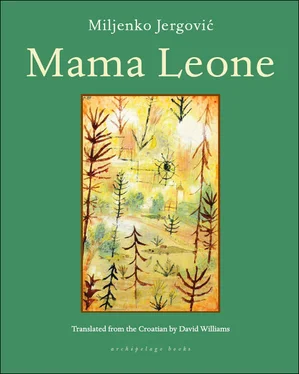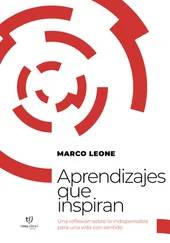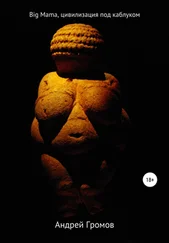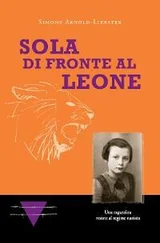Lujo clasped his hands together as if about to beg her for something important, and then he slowly opened his fingers, one by one falling away and into the abyss. They intertwined under Lujo’s chin, and Nana Erika was sure he would never again ask her for something she couldn’t do for him, nor would he ever lie to her again. Lujo, promise me something, please. We’re already old, and I can barely walk and who knows what else awaits us. So promise me that every year we’ll celebrate Christmas and that you’ll never trick me and pretend you’ve forgotten .
That evening at the head of table sat Nana Erika and her Lujo. Around them were strangers. Nana Erika looked at her Lujo, and the strangers looked at their full plates. Nothing was forgotten and nothing was missing. Not even the tinsel. She knew her Lujo would be there to support her when she asked them who and what they were and why they keep saying they’re her children and grandchildren when they well know that Erika and Lujo don’t have any children because who would bring children into the world in such times. She was so happy, singing in full voice How far is it to Bethlehem? Not that far , filling with holiness the festive hour.
It was then I longed for Babylonian women
A black car pulled up in front of Mary Kentucky’s house. A man in a bellboy uniform got out of the car, glanced around nervously, whispered something to the driver, who we can’t see from here, and ran across the lawn. He skipped along on his tiptoes, as if a lover were chasing him across a meadow or the ground beneath his feet were a minefield. He pressed the buzzer, holding his finger there until Mary Kentucky appeared at the door, and then almost slid under her armpit and scampered inside. He sat down on a small three-legged stool, took a hankie from his pocket, wiped his forehead, and let out a sigh of relief. Mary Kentucky rolled her eyes, clicked her tongue twice, and walked her walk into the kitchen.
A guy came out in a vest and boxer shorts decorated with little blue saxophones, hundreds of little blue saxophones. Omer! he was surprised, what are you doing here, you’ll lose your job . Omer raised his hand like he was stopping a train: wait!. . Wait what, I busted my balls getting you that job! Omer looked up, and calmly, as if in slow motion, got up from the stool, straightened, the whole time looking the guy in his boxers straight in the eye: Osman, I have to inform you that our father is dying . Osman leaned on the doorjamb like someone choosing between apathy and surprise: where’s he dying, bro?. . What do you mean where’s he dying, in the hospital in Crkvice. . In Crkvice , Osman repeated, although he knew well where it was, they had grown up a hundred meters from the hospital, but it had been so long since he had thought of either Crkvice or the local hospital that it was as if something precious and personal had surfaced from a great depth, bathing him in light, leaving the story about his father completely to the side. Later he would come to believe that his father had sent him the word, Crkvice, as his last bequest.
Omer skipped back over the lawn the same way he came, climbed into the car, and left Osman to try and convince Mary Kentucky that their father really was dying and that he needed a thousand dollars to fly to Bosnia and see him for the last time, to bury him and lay chrysanthemums on his grave. The chrysanthemums were the critical detail because they might just soften Mary up; they’ll seem more real to her than the death of a man she didn’t know existed, and she’ll hand over the money, the last thousand dollars of her savings, which had practically melted since Osman appeared in her life two years ago. Mary Kentucky was a checkout girl at the supermarket and all her life had dreamed of becoming a country singer. She’d scraped the money together to record her first album, written her own songs, and dreamed of getting out of that small Alabama town for someplace better, someplace where she would forget her past life and finally become someone who only shops at the supermarket.
Osman gave Mary a hug, they were standing there on the lawn and she was crying, he tried to comfort her, at his feet two suitcases, in his pocket a round-trip plane ticket for Europe. A month at the most , he told her, but she wasn’t sure whether to believe him. Somewhere deep inside, Mary Kentucky sensed that Osman didn’t actually love her and was only with her because of her money and her house, and that some day he simply wouldn’t come home. He’d vanish without saying goodbye, he’d return to his Europe, because sooner or later the war would be over, or he’d find some other girl who’ll also have money and a house, but the house will be bigger and she’ll have more money, or, as opposed to Mary, he’ll actually be in love with her. The mere thought of all this made Mary Kentucky weep. While Osman slept, she’d clean his white socks, his precious white socks that he wore when he went to play soccer with other Europeans, and afterward they’d be so dirty you couldn’t put them in the washing machine, so she’d scour them forever with a brush and she’d weep, because one day these socks wouldn’t be here, and neither would Osman. Afterward she’d kiss his sleeping forehead, and he’d frown, smack his sleeping lips, and turn over. Standing there on the lawn, all this raced through the heart and mind of Mary Kentucky, and she couldn’t stop her weeping. Osman was anxious; he was in a hurry and still had to stop by the hotel and say goodbye to his brother, but he can’t go until she’s stopped her crying. He can’t leave her like this.
Omer looked at his watch for the third time. His brother had said he was on his way forty minutes ago, and he still hadn’t arrived. Whenever Osman was late or vanished for a few hours or days, Omer would nearly have a panic attack. If it hadn’t been for his brother, he would have never made it to America. He would have probably stayed on in Sarajevo until he got killed or some great force had lifted him from where he stood, but he would never have gone this far, never all the way to Alabama. You have the heart of a hawk, he the heart of a pigeon. You’re twins, but it’s as if you’re not brothers , that’s what his father had said back when they were fifteen-year-olds off to school in Sarajevo, and ever since, Omer had been an eternal burden for Osman, a precious piece of cargo borne on the road to happiness, a reason for everyone to forgive his stronger brother his idiocies and incivility, because to have Omer in your life was like having four hands instead of two and two heads instead of one, and all the while two hands twiddled their thumbs and only a single head did the thinking. Osman’s every trait was reflected in Omer like in a mirror, a copied image, but turned the other way around. Osman was decisive about succeeding in life, Omer eternally scared that nothing would roll his way; Osman believed everyone had their uses, Omer scared that everyone had it in for him; when they went to the movies, scenes Osman found funny would bring Omer to tears; Osman loved women, Omer preferred men. . And of course, Osman had found Mary Kentucky, and Mary Kentucky had got Omer the job at the hotel.
Osman left his things in the taxi and ran inside the hotel. Omer opened the doors of the elevator and Osman stepped in, the hotel had six floors, a minute to the top and the same back down to the bottom, they hugged, everything okay? Osman nodded, I’ll miss you , Omer looked at him angrily, say hi to father for me if you see him alive , and the elevator was again on the ground floor.
His brother was at the exit when Omer broke hotel rules and hollered: bring me back something from Zenica . The reception clerk roused himself as if pricked by a needle, the gentleman reading the paper in a leather armchair glanced up at the bellboy, the little boy playing with a model Volkswagen Bug froze. . The sounds they heard from the liveried young man formed words they would never be capable of repeating or recognizing, not even on a quiz show for the million-dollar question. Osman pretended he didn’t hear anything and got into the taxi, the gentleman in the armchair returned to his paper, the little boy to his car, only the reception clerk kept his eyes pinned on Omer whose own eyes shone like glycerin, as if angels with cameras were clicking away with their flashes right in front of him.
Читать дальше












